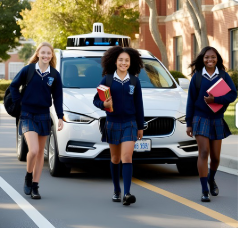Ideas & Innovations
This is our hub for ideas and innovations with the potential to transform education.

The inevitable is always certain but not always punctual: self-driving school carpools
Back in 2017, techno-optimist Jason Bedrick made the skeptical Robert Pondiscio a bet on the adoption rate for self-driving cars in the Phoenix area: “Robert and I are putting our money where our mouths are. Although I expect that in five years, few people will be sending their kids to... READ MOREFormer New York charter school authorization boss brings her tough but fair reputation to Florida
When Florida lawmakers established the first statewide Charter School Review Commission in 2022. The National Association of Charter School Authorizers also weighed in, saying that forcing school districts into sponsorship...
READ MOREWhere kids still play in the woods
FERNANDINA BEACH, Fla. – Millions of students in American public schools are lucky if they get 30 minutes of recess a day. But the students at Wild Oak Explorers spend...
READ MOREThis educator skipped the traditional teacher route and headed straight into entrepreneurship
DAVENPORT, Fla. – Valeria Oquendo didn’t set out to be an entrepreneur. “Ms. V,” as her students call her, had wanted to be a teacher since she was a teenager....
READ MORESurpluses are just a party, and parties…
During World War II the British kept a group of stately manors for high-ranking German military prisoners. The British treated them well in these gilded cages, giving them full access...
READ MORE‘If you don’t innovate, you will stagnate’: Florida charter schools urged to evolve
Education is no longer about students sitting in rows of desks from 8 a.m. to 3 p.m. And school choice, the term supporters used for years to describe the movement...
READ MOREFamilies adapt to the dysfunctional K-12 system — if they can afford it
Education Next published a piece recently by Holly Korbey called The Tutoring Revolution, which reads in part: Recent research suggests that the number of students seeking help with academics is...
READ MORESchool field trips making a comeback as education savings accounts allow more opportunities to learn by doing
TAMPA, Florida — The 22 high schoolers at Integrity Tabernacle Christian Academy donned their school T-shirts and left at dawn for the two-hour bus trip from near Orlando to ride...
READ MOREEducation Choice and Learning by Doing
Some of the most valuable learning experiences happen outside the classroom. Public education is evolving to support more learning by doing.
READ MOREMatchED and the way of the future for permissionless education
In the early days of education savings accounts, several of our intrepid Scooby-gang members wrote and spoke about user reviews as the future of “accountability.” In a multi-vendor system, we...
READ MOREFlorida parents and educators may be building the education value networks of the future
Despite calls for reform and waves of attempted transformation, key features of American schools have been remarkably stable for more than a century. Students spend six or so hours...
READ MORE

